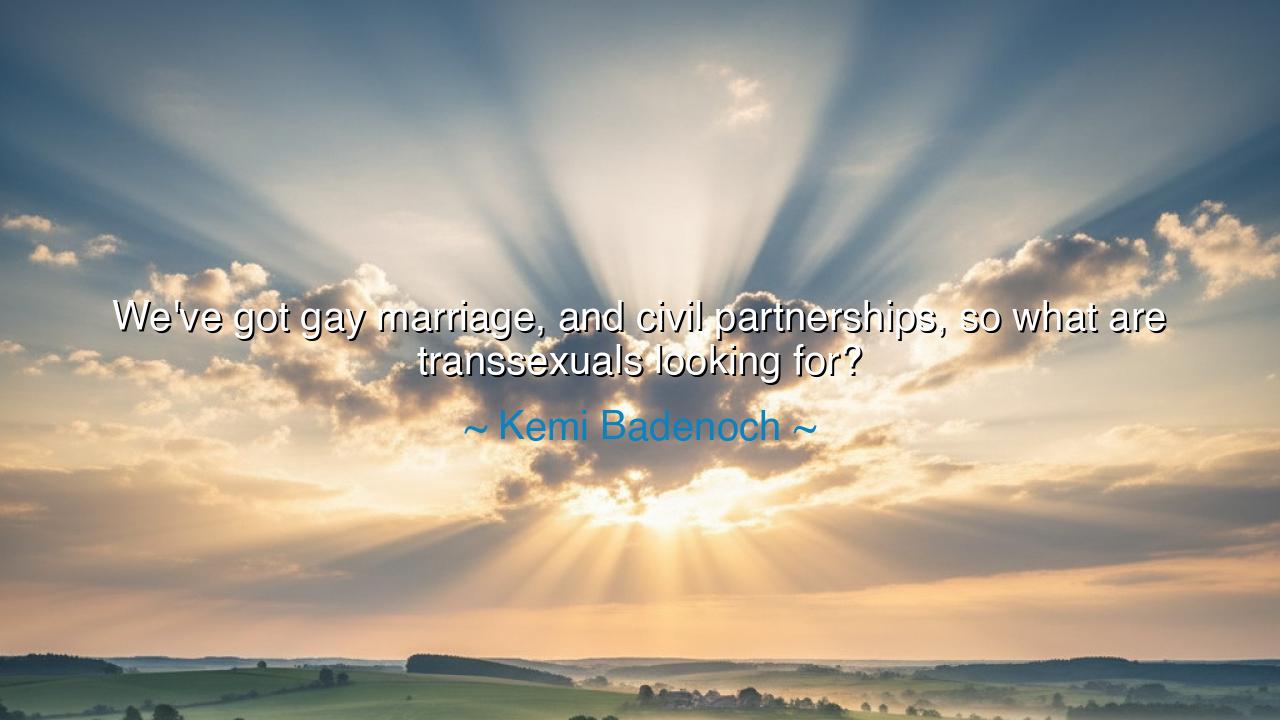
We've got gay marriage, and civil partnerships, so what are






Hear now the words of Kemi Badenoch, sharp and provocative, echoing through the chambers of debate: “We've got gay marriage, and civil partnerships, so what are transsexuals looking for?” In this utterance lies not only a question but also the tension of an age, an age in which progress has been made, yet further cries for recognition still rise. For she speaks from a place of bewilderment, perhaps resistance, asking why those who are transgender continue to seek equality when other milestones, like gay marriage and civil partnerships, have been attained. Her words reveal the struggle of understanding—where some see completion, others see only the beginning.
The meaning of her question is layered. On the surface, it suggests that society has already granted great concessions—marriage rights for same-sex couples, recognition of partnerships—and therefore asks why more is needed. Yet beneath it lies the deeper truth: that every group, every person, seeks not only what others have won but also the recognition of their own identity, dignity, and humanity. To the one outside, progress may look sufficient; to the one inside, the struggle remains unfinished.
The origin of this struggle reaches into the history of civil rights. When women gained the right to vote, some declared the battle for equality finished, yet women continued to fight for education, work, and bodily autonomy. When slavery was abolished, some proclaimed freedom complete, yet African Americans in the United States still endured segregation, violence, and denial of true equality. In the same way, Badenoch’s words reflect the age-old misunderstanding: that one victory means the war is over, when in truth justice demands more than fragments—it demands fullness.
Consider the story of Marsha P. Johnson, a Black transgender woman and activist in New York during the Stonewall uprising of 1969. To some, the fight for gay rights was enough, but for Marsha and others, the battle included trans lives that were pushed to the margins, even within their own movement. She fought not merely for marriage or partnerships, but for the right to live openly, safely, and with dignity. Her life, and the struggles of those like her, answer Badenoch’s question: trans people are not looking for privileges beyond others, but for the same recognition of their humanity, tailored to the unique challenges they face.
Badenoch’s words carry a sting because they reveal the danger of complacency. It is easy for societies to mark a single milestone—gay marriage, civil rights legislation, a new law—and then grow weary, asking why more is needed. But justice is not partial; it cannot stop halfway. To deny one group on the grounds that another has been satisfied is to misunderstand the very nature of equality, which is not a rationed gift, but a universal birthright.
The lesson, then, is clear: when one group’s voice is raised, do not silence it by pointing to victories already won for others. Each struggle has its own shape, its own needs, its own injustices to overturn. To honor equality is to walk with each group in turn until all stand free. What trans people seek, as others have before them, is simply recognition, dignity, and safety—the ability to live as themselves without fear or denial.
So, children of tomorrow, learn from this teaching: do not grow weary of justice, nor impatient with the cries of those still unheard. Celebrate victories, yes, but do not let celebration become complacency. Ask not “what more do they want?” but rather, “what remains undone?” For the measure of a just society is not how far it has come, but how it treats those still left behind. Only when all are recognized in their fullness—gay, straight, cisgender, transgender—can we say the work of equality is complete.






AAdministratorAdministrator
Welcome, honored guests. Please leave a comment, we will respond soon